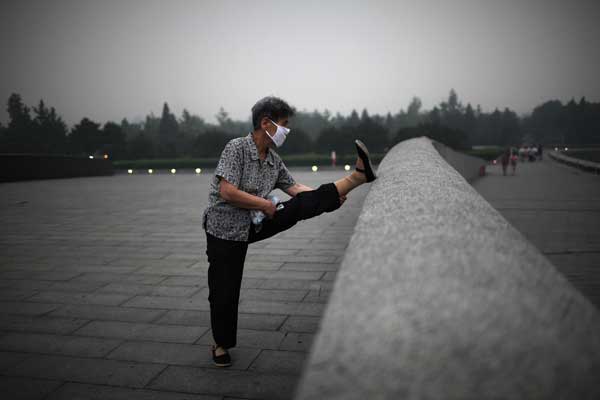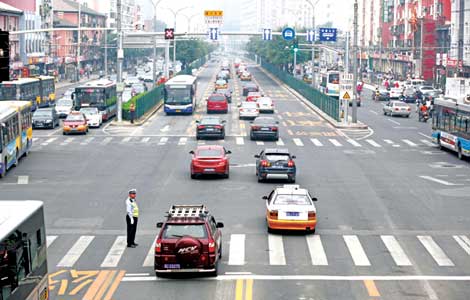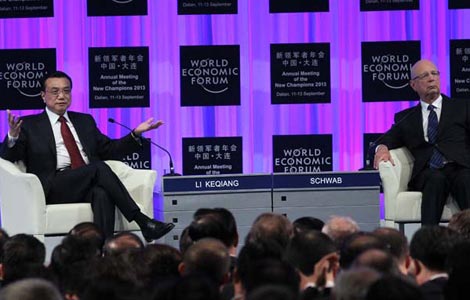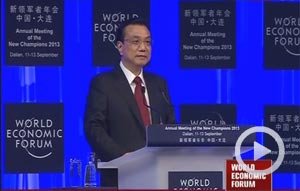China gets tough on air pollution
Updated: 2013-09-13 01:44
By Wu Wencong (China Daily)
|
||||||||
Economic concerns
Some experts expressed concerns that the measures may hamper economic growth. Wang admitted that the plan may have an adverse effect on some industries, but said it will favor many others.
"For instance, steel production capacity will be largely reduced and the industry will be able to develop in a much healthier mode," he said. "An estimated 1.7 trillion yuan ($277 billion) of investment from all channels will back up the environmental protection industry. We are sure that their combined influence on the economy will be positive."
 |
|
A Beijing resident defies the heavily polluted air to take her morning exercise. [Phoo/Xinhua] |
Some experts expressed the view that a certain amount of economic fallout is natural and reasonable.
"Improving the environment is basically a form of construction, and one that definitely requires investment from society," said Zhou Dadi, vice-chairman of the China Energy Research Society.
"We have sacrificed the environment to the previous economic growth figures and the financial cost is certain to rise if we include all these factors," he said.
Another concern troubling experts and officials is the authenticity and integrity of the data involved in the plan, because they are "the basis to ensure the action plan can really make a difference to the environment", as Wang put it.
He said national-level monitoring sites run directly by the National Environmental Monitoring Center will be set up in every county-level city. There will be three sites in each municipality, two in each provincial capital and one in each of the other cities.
The construction and management of the monitoring sites is still under discussion, said Li Guogang, deputy head of the China National Environmental Monitoring Center, who stressed that the technology will not be a problem.
Li said that in addition to 74 cities that began releasing PM2.5 readings in January, a further 116 are preparing for the construction of PM2.5 monitoring sites, which will be fully operational by the end of the year.
Zhou, from the China Energy Research Society, said the accuracy of the official readings could be ascertained by comparing them with readings conducted by independent research institutes. He pointed out that it's hard to fool the public during periods of heavy pollution, a fact that should prevent the compilation and release of skewed data.
Assessment
The action plan is deemed the toughest ever, not just because of the stringent targets it sets, but also because of its performance assessment system, which will see the Organization Department of the Communist Party of China becoming involved with an environmental action plan for the first time.
The department has the power to appoint or dismiss officials, and if local governments fail to reach their allocated targets, the positions and political futures of the officials involved may be affected, according to Wang.
However, he said the action that will be taken against officials who fail to meet the targets has yet to be formulated: "A detailed assessment method will be released to the public later, with clear indications of the repercussions for local officials if they don't achieve the targets or fail to respond to heavy pollution."
Experts called the plan a working guide for the government over the next five years. Although improvements will undoubtedly result, the public should not count on the plan to provide a total solution to the problem of pollution.
"Western countries have spent decades trying to improve their air quality, and are still trying. What China is doing here is trying its best to make improvements happen as soon as possible, but we also need to be realistic about the hardships ahead and prepare for a protracted war against pollution. It's a war that will involve every single member of the public," said Chai Fahe, vice-president of the Chinese Research Academy of Environmental Sciences.
Jiang Xueqing and Yang Wanli contributed to this story.
Related reading:
Key points of the action plan

 Plenty of fizz
Plenty of fizz
 Traffic about-face seeks to ease congestion
Traffic about-face seeks to ease congestion
 Another iPhone4 explodes while charging
Another iPhone4 explodes while charging
 Premier stresses transformation of the economy
Premier stresses transformation of the economy
 Soyuz capsule returns from space station
Soyuz capsule returns from space station
 China's Christian churches reduce leaders' age ceiling
China's Christian churches reduce leaders' age ceiling
 Student's rare blood bonds Kazakhstan and China
Student's rare blood bonds Kazakhstan and China
 Apple's low-end phone price disappointing
Apple's low-end phone price disappointing
Most Viewed
Editor's Picks

|

|

|

|

|

|
Today's Top News
US moves against China firms criticized
3 sentenced to death for Xinjiang terror attack
Xi welcomes talks on Iran
Assad agrees to hand over chemical weapons
Time of opportunities, challenges
China sets caps for rare earths exploration
Ending non-tariff barriers benefits global economy
Developing nations need shift to balanced growth
US Weekly

|

|






